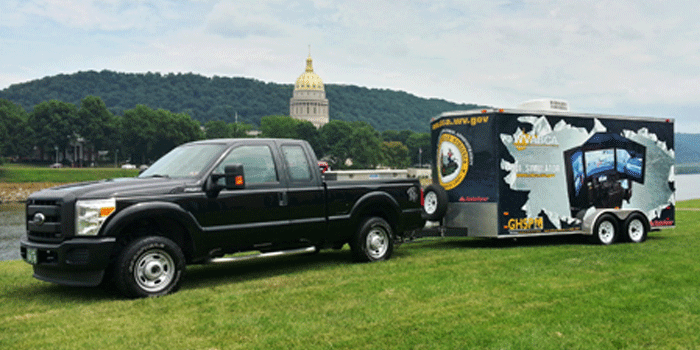Interactive learning is the basis of a successful drunk-drinking education program created by the West Virginia Alcohol Beverage Control Administration.
Now in its fifth year, the DUI Simulator Program buckles participants into the seat of a full-sized driving simulator. The computer program — built into a trailer — mimics different driving conditions, including weather, times of day and, most importantly, rising levels of driver intoxication.
“It’s an effective way to deliver a message that’s very important,” says Gary Robinson, WVABCA spokesperson. “It gives students the opportunity to experience various driving conditions and hazards, while safely operating the driving simulation system.”
The program has reached over 20,000 students and has visited all of West Virginia’s high schools, except for two. The trailer has also traveled to colleges, universities and fairs. “It’s very popular,” Robinson says. “We’ve received a lot of demand for it.”
Funding the program is a $90,000 Good Neighbor Citizenship grant from State Farm Insurance, plus $35,000 from the WV Governor’s Highway Safety Program. “This is a good example of municipal, state and national government coming together with the private sector to educate the public and protect the kids,” Robinson adds.
The program includes more than just the simulator. Before participants begin the computer portion, they first listen to a lecture on drunk driving. “That way it’s more than just kids getting into the simulator and playing around in it like it’s a video game,” Robinson says. “It’s important to have that learning aspect beforehand.”
Afterwards, a survey helps collect information on participants and their experiences. A QR code on the side of the trailer allows individuals to access statistical information, locations of SADD chapters and details about a new contest related to the program.
Students Talking to Students
Building on the success of the DUI Simulator Program, the WVABCA last year launched “No School Spirits,” which accepted PSA drunk-driving essays from high-school students. The winning entry by Paige Lucas earned her school $1,000 and was made into a 60-second television advertisement.
“We engaged that high school’s drama department as actors for the ad,” Robinson says. “We got a lot of people involved. This message came from the kids, which is very important. So often we look at the youth and we think that they’re part of the problem. But they’re part of the solution, especially when you get students talking to the students.”
The ad depicts the tragic aftermath of an underage drunk-driving accident, through the eyes of high-school students. “Is it worth it? It’s up to you,” ask mourners at the end of the spot, “Say, ‘No school spirits for me.’”
Funded by the same supporters of the DUI Simulator Program, the ad is viewable on YouTube or on the WVABCA website. It originally aired last April and May during prom and graduation season. Moreover, Lucas and her high school used their $1,000 prize to host an alcohol-free, after-prom activity for students.
WVABCA officials repeated the program in 2014. They expanded the prize pool to include first, second and third place, along with honorable mentions. A winner has been chosen and their entry will again become the basis of a pro-sobriety advertisement, funded through WVABCA and other program sponsors.










